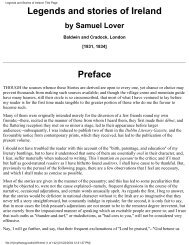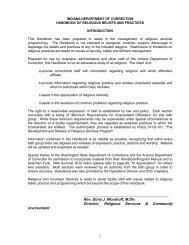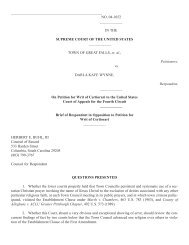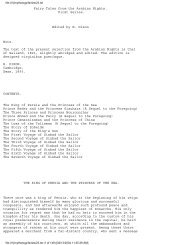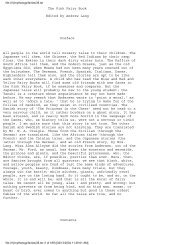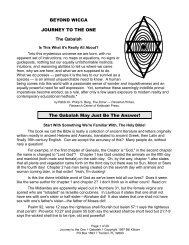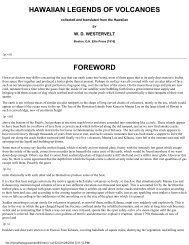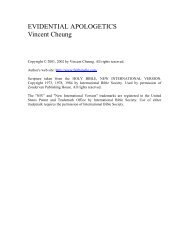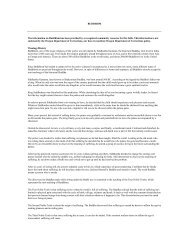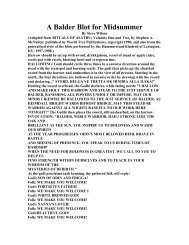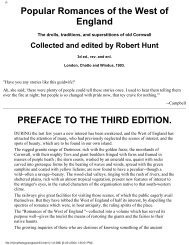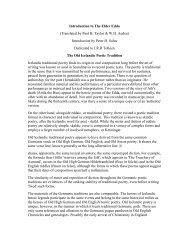Create successful ePaper yourself
Turn your PDF publications into a flip-book with our unique Google optimized e-Paper software.
oken vice, with a barrel of beer placed near it. One of the men sat down and mended the vice. Then they made another furrow, and when<br />
they returned to the spot they found there a two-eared dish filled to the brim with bara a chwrw, or "bread and beer." The word vice, I may<br />
observe, is an English term, which is applied in Carnarvonshire to a certain part of the plough: it is otherwise called bins, but neither does<br />
this seem to be a Welsh word, nor have I heard either used in South Wales.<br />
At times one of the fairies was in the habit, as I was told by more than one of my informants, of coming out of Llyn Corwrion with her<br />
spinning-wheel (troell bach) on fine summer days and betaking herself to spinning. While at that work she might be heard constantly<br />
singing or humming, in a sort of round tune, the words sìli ffrit. So that sìli ffrit Leisa Bela may now be heard from the mouths of the<br />
children in that neighbourhood. But I have not been successful in finding out what Liza Bella's 'silly frit' exactly means, though I am, on<br />
the whole, convinced that the words are other than of Welsh origin. The last of them, ffrit, is usually applied in Cardiganshire to anything<br />
worthless or insignificant, and the derivative, ffrityn, means one who has no go or perseverance in him: the feminine is ffriten. In<br />
Carnarvonshire my wife has heard ffrityn and ffritan applied to a small man and a small woman respectively. Mr. Hughes says that in<br />
Merioneth and parts of Powys sìli ffrit is a term applied to a small woman or a female dwarf who happens to be proud, vain, and fond of<br />
the attentions of the other sex (benyw fach neu goraches falch a hunanol a fyddai hoff o garu); but he thinks he has heard it made use of<br />
with regard to the gipsies, and possibly also to the Tylwyth Teg. The Rev. O.<br />
p. 65<br />
Davies thinks the words sìli ffrit Leisa Bèla to be very modern, and that they refer to a young woman who lived at a place in the<br />
neighbourhood, called Bryn Bèla or Brymbèla, 'Bella's Hill,' the point being that this Bella was ahead, in her time, of all the girls in those<br />
parts in matters of taste and fashion. This however does not seem to go far enough back, and it is possible still that in Bèla, that is, in<br />
English spelling, Bella, we have merely a shortening of some such a name as Isabella or Arabella, which were once much more popular in<br />
the Principality than they are now: in fact, I do not feel sure that Leisa Bèla is not bodily a corruption of Isabella. As to sìli ffrit, one might<br />
at first have been inclined to render it by small fry, especially in the sense of the French 'de la friture' as applied to young men and boys,<br />
and to connect it with the Welsh sil and silod, which mean small fish; but the pronunciation of silli or sìli being nearly that of the English<br />
word silly, it appears, on the whole, to belong to the host of English words to be found in colloquial Welsh, though they seldom find their<br />
way into books. Students of English ought to be able to tell us whether frit had the meaning here suggested in any part of England, and<br />
how lately; also, whether there was such a phrase as 'silly frit' in use. After penning this, I received the following interesting<br />
communication from Mr. William Jones, of Llangollen:--The term sìli ffrìt was formerly in use at Beddgelert, and what was thereby meant<br />
was a child of the Tylwyth Teg. It is still used for any creature that is smaller than ordinary. 'Pooh, a silly frit like that!' (Pw, rhyw sìli ffrit<br />
fel yna!). 'Mrs. So-and-So has a fine child.' 'Ha, do you call a silly frit like that a fine child?' (Mae gan hon a hon blentyn braf. Ho, a ydych<br />
chwi'n galw rhyw sìli ffrit fel hwnna'n<br />
p. 63<br />
braf?) To return to Leisa Bèla and Belenë, it may be that the same person was meant by both these names, but I am in no hurry to identify<br />
them, as none of my correspondents knows the latter of them except Mr. Hughes, who gives it on the authority of the bard Gutyn Peris,<br />
and nothing further so far as I can understand, whereas Bèla will come before us in another story, as it is the same name, I presume, which<br />
Glasynys has spelled Bella in Cymru Fu.<br />
So I wrote in 1881: since then I have ascertained from Professor Joseph Wright, who is busily engaged on his great English Dialect<br />
Dictionary, that frit 1 is the same word, in the dialects of Cheshire, Shropshire, and Pembrokeshire, as fright in literary English; and that<br />
the corresponding verb to frighten is in them fritten, while a frittenin (= the book English frightening) means a ghost or apparition. So sìli<br />
ffrit is simply the English silly frit, and means probably a silly sprite or silly ghost, and sìli ffrit Leisa Bèla would mean the silly ghost of a<br />
woman called Liza Bella. But the silly frit found spinning near Corwrion Pool will come under notice again, for that fairy belongs to the<br />
Rumpelstiltzchen group of tales, and the fragment of a story about her will be seen to have treated Silly Frit as her proper name, which she<br />
had not intended to reach the ears of the person of whom she was trying to get the better.<br />
These tales are brought into connexion with the present day in more ways than one, for besides the various accounts of the bwganod or<br />
bogies of Corwrion frightening people when out late at night, Mr. D. E. Davies knows a man, who is still living, and who<br />
p. 67<br />
<strong>Title</strong> <strong>Page</strong><br />
well remembers the time when the sound of working used to be heard in the pool, and the voices of children crying somewhere in its<br />
depths, but that when people rushed there to see what the matter was, all was found profoundly quiet and still. Moreover, there is a family<br />
or two, now numerously represented in the parishes of Llandegai and Llanllechid, who used to be taunted with being the offspring of fairy<br />
ancestors. One of these families was nicknamed 'Simychiaid' or 'Smychiaid'; and my informant, who is not yet quite forty, says that he<br />
heard his mother repeat scores of times that the old people used to say, that the Smychiaid, who were very numerous in the<br />
neighbourhood, were descended from fairies, and that they came from Llyn Corwrion. At all this the Smychiaid were wont to grow<br />
mightily angry. Another tradition, he says, about them was that they were a wandering family that arrived in the district from the direction<br />
of Conway, and that the father's name was a Simwch, or rather that was his nickname, based on the proper name Simwnt, which appears to<br />
have once been the prevalent name in Llandegai. The historical order of these words would in that case have been Simwnt, Simwch,<br />
Simychiaid, Smychiaid. Now Simwnt seems to be merely the Welsh form given to some such English name as Simond, just as Edmund or<br />
Edmond becomes in North Wales Emwnt. The objection to the nickname seems to lie in the fact, which one of my correspondents points<br />
file:///I|/mythology/celtic/26/26.html (40 of 237) [01/22/2004 12:42:26 PM]



